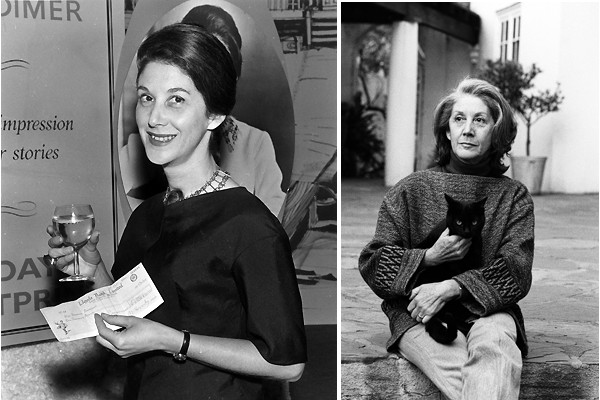Nadine Gordimer is asked all these “silly” questions that journalists would typically never ask an author. Her answers are funny but revealing. It’s a UK Guardian interview done during the 2010 Hay Festival. Amazing!

What is the most important lack in your life?
I’ve lived that life in Africa without learning an African language. Even in my closest friendships, literary and political activities with black fellow South Africans, they speak only English with me. If they’re conversing together in one of their mother tongues (and all speak at least three or four of each other’s), I don’t understand more than a few words that have passed into our common South African use of English. So I’m deaf to an essential part of the South African culture to which I’m committed and belong.
What’s the most blatant lie you’ve ever told?
Really can’t distinguish. Living through apartheid under Secret Police surveillance made those of us who opposed the regime actively, accomplished liars. You lied that you didn’t know the whereabouts of someone the police were looking to arrest, you lied about your encounters and movements; had to, in order to protect others and yourself.
What is the most demeaning thing said about you as a writer?
My eight-year-old son, when asked by a school friend what his mother’s job was, said: “She’s a typist.” True, I was in my study typing some fiction or other at the time; I overheard, through my window, his judgment in the garden.
You were awarded the Nobel prize in literature by the king of Sweden. Do you look back on that as the best moment in your life?
Best moment? Reinhold Cassirer and I had just married, and were at a party in London. He had gone to find a friend in an adjoining room. I found myself standing beside a woman I didn’t know, both of us amiably drinks in hand. He appeared in the doorway. She turned aside to me and exclaimed excitedly: “Who’s that divine man?” I said: “My husband.”
How do you react to a bad review of one of your books?
Ignore it if it’s by some hack, easily recognized by his/her poor understanding of what the book’s about. Pretend (to myself) to ignore it if its written by one whose judgment and critical ability I respect; and then take that judgment into account when, as my own sternest critic, I judge what I achieved or didn’t in that book.
While writing, do you take drugs, smoke marijuana or drink alcohol to beef up your creative imagination?
Only a double Scotch; hours after my writing day is over.
As a liberated woman, would you nevertheless prefer to have been born a man?
Both sexes experience the joys of love-making. If she chooses, woman has the additional extraordinary experience of growing a life inside herself, and presenting the world to it. It’s painful – all right. But the wider experience in life a writer has, the better the ability to identify with lives other than the writer’s own, and create varieties of character, states of being, other than his/her own. I sometimes think, for example, I’ve missed out on extending emotional experience by never having been sexually attracted to a woman. Anyway, a writer as such is a special kind of androgynous creature, all sexes and all ages when creating fictional characters, all the people he or she has known, observed or interacted with. So while I’m a woman, as a writer I’m a composite intelligence.
When are you going to write your autobiography?
Autobiography? Never. I am much too jealous of my privacy. Secretive, if you like. It’s all one has, in the end. Whereas anyone’s biographer has to make do with what’s somehow accessible, by hook or by crook.
Read More UK Guardian








Tolulope Popoola November 01, 2013 08:40
I like these interesting questions. Maybe interviewers should ask these type of weird ones more often :)